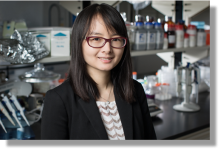MSE 298 Seminar (Zoom): "Cinametography" of Soft, Biological and Energy Matter at the Nanoscale

Assistant Professor
Department of Materials Science and Engineering
University of Illinois at Urbana-Champaign
Zoom Link: https://uci.zoom.us/j/93523874547?pwd=bXRGd3BwMFJWSHY3WGZDaGRucCt0dz09, meeting ID 935 2387 4547, passcode 740726
Abtract: I will discuss my group’s recent progress on adapting a suite of electron microscopy methods (e.g., liquid-phase TEM, electron tomography, scan-ning electron nanodiffraction (SEND)) and machine learning-based data mining to synthetic soft, biological and energy related systems. In the first system, we focus on the phase behaviors of nano-sized building units as they are dispersed in solution. As a proof of concept, we directly image the crystallization pathways of nanosized colloids into superlattices, where the discreteness and multi-scale coupling effects complicate the free energy landscape. We find that there exist similarities to the prevalent model system of micron-sized colloids, such as a non-classical crystallization pathway and an agreement with the capillary wave theory. But there are also differences, in particular, a universal layer-by-layer growth mode that we observe for diverse nanoparticle shapes. Single particle tracking and simulations combined unravel the energetic and kinetic features associated with this crystal growth mode, enabling advanced crystal engineering. In the second system, we study membrane proteins in their native lipid and liquid environment at the nanometer resolution. The proteins exhibit real-time “fingering” fluctuations, which we attribute to dynamic rearrangement of lipid molecules wrapping the proteins. The conformational coordinates of protein transformation obtained from the real-space movies are used as inputs in our molecular dynamics simulations, to verify the driving force underpinning the function-relevant fluctuation dynamics. In the third system, we further push direct imaging to separation membranes and multivalent ion batteries, where the strain embedded heterogeneously within leads to morphogenesis and distinct charge transport properties. We foresee our suite of “cinematography” tools to provide crucial and complementary insights in various materials systems, with the common theme of probing the elusive nanoscale.
Bio: Qian Chen is currently an assistant professor in the Department of Materials Science and Engineering at the University of Illinois at Urbana-Champaign (UIUC). She obtained her doctorate from the same department with Steve Granick (2012) and did her postdoc with Paul Alivisatos at UC Berkeley under a Miller Fellowship. She joined the faculty of UIUC in 2015 and has since received awards for research in her group, including the Victor LaMer award from the American Chemical Society (2015), Forbes 30 under 30 Science List (2016), Air Force Office of Scientific Research YIP award (2017), National Science Foundation CAREER award (2018), Sloan Research Fellow in chemistry (2018), Unilever Award from the American Chemical Society (2018), and Dean’s Award for Excellence in Research (2020). The research in her group focuses on the broad scheme of imaging, understanding and engineering soft materials at the nanoscale, including systems such as colloidal self-assembly, protein aggregation, advanced battery devices and energy-efficient separation strategies.
Share
Related Content
| Attachment | Size |
|---|---|
| 473.31 KB |
Upcoming Events
-
EECS Seminar: Less Compute, More Intelligence – Efficient and Autonomous Generative AI and Agents
-
MAE 298: Microscopic Robots that Sense, Act and Compute
-
CBE 298 Seminar: Interface Modification for Electrocatalysis
-
CEE Ph.D. Defense Announcement: Machine Learning and Remote Sensing for Environmental Modeling - From Large-Scale Streamflow Forecasting to Malaria Risk Mapping
-
CBE Special Seminar: Operando Electrochemical Methods at Dynamic Energy Materials Interfaces
